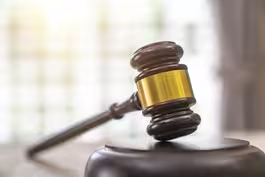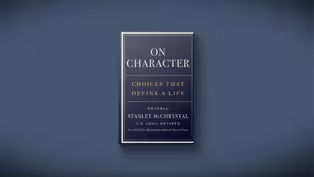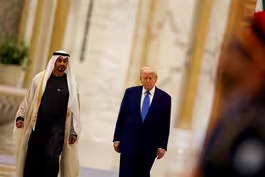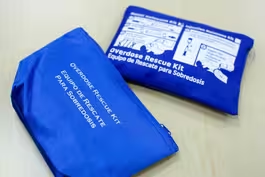
Supreme Court hears Trump's birthright citizenship challenge
Clip: 5/15/2025 | 8m 39sVideo has Closed Captions
Supreme Court hears Trump’s challenge to birthright citizenship and judicial constraints
The Supreme Court heard arguments in one of the most consequential cases of the year. It involves the ability for President Trump to carry out his executive order ending birthright citizenship and the power allowing a federal judge to issue a nationwide block on those orders. Geoff Bennett discussed the arguments with law professor Amanda Frost and News Hour Supreme Court analyst Amy Howe.
Problems playing video? | Closed Captioning Feedback
Problems playing video? | Closed Captioning Feedback
Major corporate funding for the PBS News Hour is provided by BDO, BNSF, Consumer Cellular, American Cruise Lines, and Raymond James. Funding for the PBS NewsHour Weekend is provided by...

Supreme Court hears Trump's birthright citizenship challenge
Clip: 5/15/2025 | 8m 39sVideo has Closed Captions
The Supreme Court heard arguments in one of the most consequential cases of the year. It involves the ability for President Trump to carry out his executive order ending birthright citizenship and the power allowing a federal judge to issue a nationwide block on those orders. Geoff Bennett discussed the arguments with law professor Amanda Frost and News Hour Supreme Court analyst Amy Howe.
Problems playing video? | Closed Captioning Feedback
How to Watch PBS News Hour
PBS News Hour is available to stream on pbs.org and the free PBS App, available on iPhone, Apple TV, Android TV, Android smartphones, Amazon Fire TV, Amazon Fire Tablet, Roku, Samsung Smart TV, and Vizio.
Providing Support for PBS.org
Learn Moreabout PBS online sponsorshipAMNA NAWAZ: Welcome to the "News Hour."
Today, the U.S. Supreme Court heard arguments in one of the most consequential cases of the year, the ability for President Trump to carry out his executive order ending birthright citizenship.
That's the constitutionally protected right of citizenship for those born in the United States regardless of their parents' nationality or immigration status.
GEOFF BENNETT: The central question in this case, though, is the limits of judicial power, namely universal injunctions which allow a federal judge to issue a nationwide block to executive orders.
In recent months, several district court judges have used nationwide injunctions to pause a number of the Trump administration's policies, including an executive order which seeks to end birthright citizenship.
Today, the government argued those judges are overstepping their constitutional authority.
Earlier, President Trump weighed in, posting on social media -- quote -- "Birthright citizenship is about the babies of slaves and it had nothing to do with illegal immigration for people wanting to scam our country."
We will sort that out in a moment.
But, outside the court today, a group of attorneys general who are challenging the president's order said the question of birthright citizenship has long been settled.
MATTHEW PLATKIN (D), New Jersey Attorney General: A hundred and fifty-seven years ago, we came together as a nation post-Civil War and said never again were we going to debate whether babies born on American soil are entitled to the rights and privileges of American citizenship.
And contrary to what the United States is saying, citizenship doesn't turn on or turn off when you cross state lines.
GEOFF BENNETT: And joining us now to discuss today's arguments are Amanda Frost, professor of immigration and citizenship law at the University of Virginia, and Amy Howe, co-founder of SCOTUSblog and our new Supreme Court analyst here at the "News Hour."
Welcome to you both.
And, Amy, it's great to have you here officially in your new role.
AMY HOWE: Thanks very much.
GEOFF BENNETT: So, several justices today underscored the fact that the focus of today's arguments wasn't really about the merits of the case, but rather on nationwide injunctions.
What's your sense of why that was the government's focus and strategy?
AMY HOWE: I think the government was trying to isolate this.
This is an issue that has been the bane of both Democratic and Republican administrations, as the Trump solicitor general, D. John Sauer, said in his presentation to the justices.
This is a bipartisan issue.
And it has -- the issue of universal injunctions has really stopped the Trump administration from being able to implement a variety of policies and orders since the start of the Trump administration on January 20.
And they really wanted the justices to focus on these universal injunctions, including because in recent years several justices have expressed skepticism about the propriety of universal injunctions and suggested that the courts should weigh in on them.
GEOFF BENNETT: On that point, the fact that this has been debated, how much power federal judges should have to block controversial White House policies nationwide, how sympathetic were the justices to this idea that these injunctions are a problem for the rule of law at large?
AMANDA FROST, University of Virginia School of Law: Yes, so I think the justices, many of whom have had experience in the executive branch themselves and previous administrations, are generally looking to try to limit or restrict nationwide injunctions.
They don't like the fact that a democratically elected president sees their policies stymied or stopped in their tracks by a single district court judge.
Justice Alito mentioned being concerned about 680 district court judges across the nation having this power, and he said they can get it wrong.
But on the flip side, they're dealing with a president that has unilaterally rewritten the law through executive order, or tried to, and the birthright citizenship executive order is a perfect example of that.
GEOFF BENNETT: And the premise of the government's argument was really picked apart by the liberal wing of the court.
Justice Jackson addressed the U.S. solicitor general and warned that if the Supreme Court were to narrow the scope of nationwide injunctions, it could effectively permit the administration to carry out unlawful actions while leaving individuals without meaningful recourse.
Take a listen.
KETANJI BROWN JACKSON, U.S. Supreme Court Associate Justice: The real concern, I think, is that your argument seems to turn our justice system, in my view at least, into a catch me if you can kind of regime from the standpoint of the executive, where everybody has to have a lawyer and file a lawsuit in order for the government to stop violating people's rights.
And I don't understand how that is remotely consistent with the rule of law.
GEOFF BENNETT: How did that land?
AMY HOWE: It landed -- I think, it was something that the other justices picked up on, some of the other liberal justices.
But some of the other justices, some of the conservative justices, were also expressing concern about -- even though this was ostensibly a case about universal injunctions about the merits of Trump's executive order on birthright citizenship and whether or not this was something that the justices were going to have to weigh in on either in this dispute or in a future dispute.
Justice Neil Gorsuch, for example, said, how can we get to this issue expeditiously?
GEOFF BENNETT: And on the specific issue of whether it's practical to end birthright citizenship, a lot of people are focused on what conservative Justice Brett Kavanaugh said.
Here he is.
BRETT KAVANAUGH, U.S. Supreme Court Associate Justice: On the day after it goes into effect -- this is just a very practical question on how is it going to work -- what do hospitals do with a newborn?
What do states do with a newborn?
GEOFF BENNETT: So how did the government answer that question?
AMANDA FROST: I thought the government answered that question very poorly, and I was surprised, in fact, that they had almost no answer to how they were going to implement this executive order.
And if they win this case in the Supreme Court, 30 days from now, that order would go into effect.
There's 3.6 million children born in the United States every year, and every single one of those families would have to find a way to prove their child's citizenship when the birth certificate alone showing proof of birth in the U.S. no longer suffices.
I was really shocked they didn't have an answer, and it played well into the hands of the plaintiffs, who were saying there's going to be chaos if you let this executive order go into effect while the case is pending.
That's the key.
What happens while the case is pending before the Supreme Court rules?
That could be at least a year, and the idea that it would go into effect without any plan about how to implement it is a huge problem for the administration.
GEOFF BENNETT: What struck you about the line of questioning there?
AMY HOWE: I think exactly the same thing.
I think that the justices really were having a hard time -- even though this was ostensibly an argument about universal injunctions, were really having a hard time separating the two.
And a lot of them, I think, may have gone in sort of predisposed, or at least when they agreed to take up the case, predisposed to the idea that they disliked universal injunctions.
And particularly in the context of this case, and as the question from Justice Kavanaugh suggested, when you're talking about birthright citizenship and maybe talking about universal injunctions more broadly, it's maybe not quite as simple as they thought.
GEOFF BENNETT: The fact that the president, the administration is spearheading this effort to end birthright citizenship, we can't lose sight of how really seismic that is.
AMANDA FROST: Yes.
I mean, this is -- birthright citizenship was intended to overrule Dred Scott which said no Black person could be a citizen, and integrate the children of immigrants into our society, ensure their citizenship.
That's what the Reconstruction Congress said.
So, if you're an originalist, you should be all in on the idea of near universal birthright citizenship.
And it's been basically unquestioned for over a century.
And to have a president declare by executive order that he can rewrite it, I mean, that is seismic.
GEOFF BENNETT: Amy, what's the timeline here?
AMY HOWE: It's hard to say exactly what the timeline is.
A couple of years ago, the Supreme Court heard arguments on two other cases that came up on the emergency docket involving the Biden administration vaccine mandates and issued decisions in those in just a couple of days.
On the other hand, they have also taken a couple of months to act on an emergency application involving an EPA rule.
What we do know is that the justices will almost certainly take their summer recess at the end of June or the beginning of July, and I would expect them to have resolved this by then.
GEOFF BENNETT: Amy Howe, Amanda Frost, our thanks to you both.
AMANDA FROST: Thanks.
AMY HOWE: Thank you.
AMANDA FROST: Thanks for having us.
GEOFF BENNETT: Online, you can watch our in-depth report about the history and legacy of birthright citizenship and the 1898 Supreme Court case that confirmed the current legal precedent.
That's at PBS.org/NewsHour.
A Brief But Spectacular take on a birthright to capital
Video has Closed Captions
Clip: 5/15/2025 | 3m 45s | BRIEF BUT SPECTACULAR (3m 45s)
Chef inspires others to embrace their heritage through food
Video has Closed Captions
Clip: 5/15/2025 | 6m 39s | Lao and Proud: Chef inspires others to embrace their heritage and history through food (6m 39s)
Judge whose son was murdered urges leaders to end rhetoric
Video has Closed Captions
Clip: 5/15/2025 | 7m 16s | 'Lives are at stake': Judge whose son was murdered urges leaders to end hostile rhetoric (7m 16s)
News Wrap: Walmart says it is raising prices due to tariffs
Video has Closed Captions
Clip: 5/15/2025 | 6m 30s | News Wrap: Walmart says it is raising prices due to tariffs (6m 30s)
Retired Gen. McChrystal on current Pentagon leadership
Video has Closed Captions
Clip: 5/15/2025 | 7m 19s | Retired Gen. McChrystal on current Pentagon leadership and his new book 'On Character' (7m 19s)
Trump wraps Mideast tour with UAE pledging new investment
Video has Closed Captions
Clip: 5/15/2025 | 5m 30s | Trump wraps Mideast tour with UAE pledging new investments in U.S. (5m 30s)
What's behind the significant drop in opioid overdose deaths
Video has Closed Captions
Clip: 5/15/2025 | 5m 44s | What's behind the significant drop in opioid overdose deaths (5m 44s)
Providing Support for PBS.org
Learn Moreabout PBS online sponsorship
- News and Public Affairs

FRONTLINE is investigative journalism that questions, explains and changes our world.

- News and Public Affairs

Amanpour and Company features conversations with leaders and decision makers.












Support for PBS provided by:
Major corporate funding for the PBS News Hour is provided by BDO, BNSF, Consumer Cellular, American Cruise Lines, and Raymond James. Funding for the PBS NewsHour Weekend is provided by...






